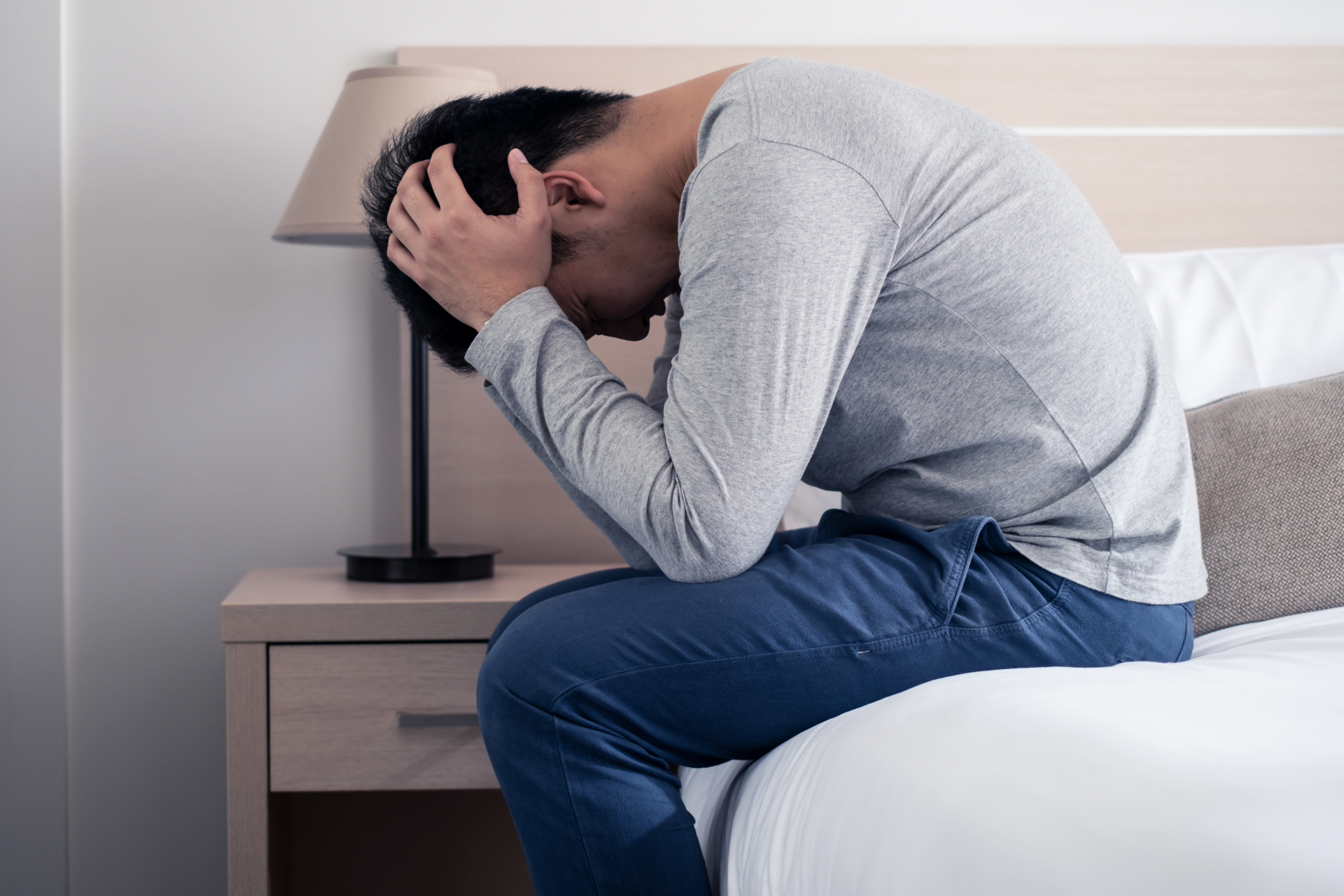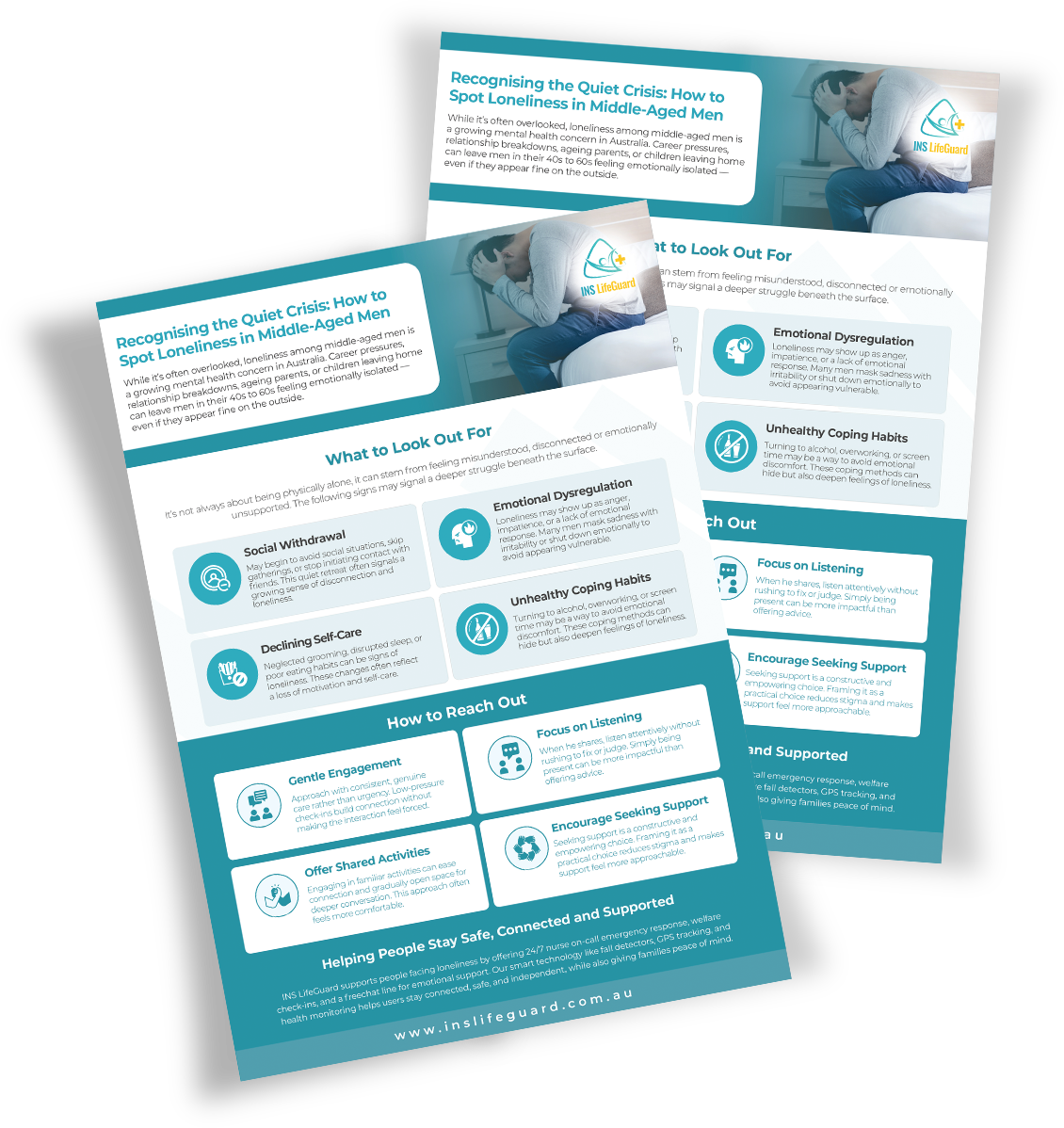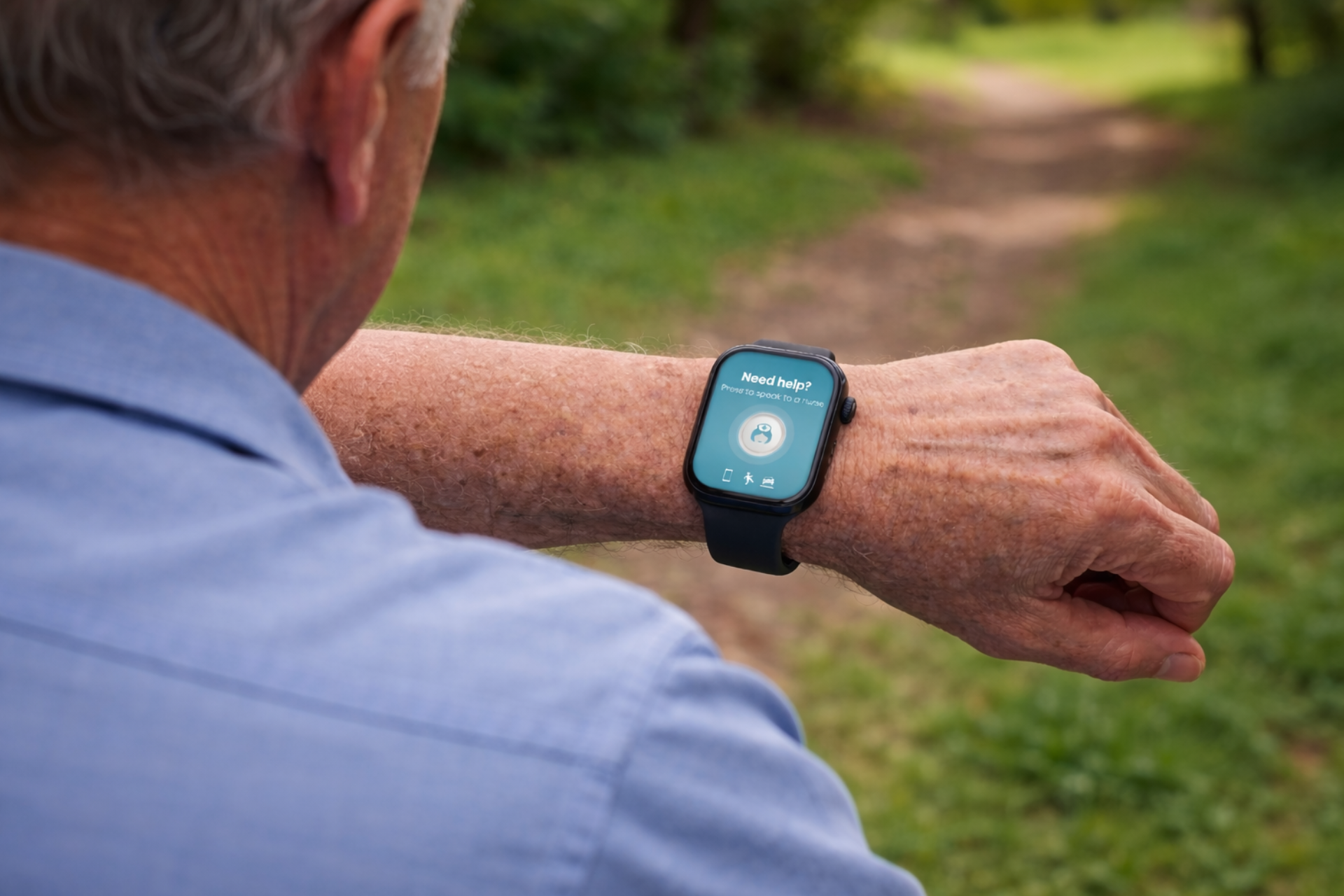Have a Question?
Confronting Loneliness Men Face: Strategies for Connection and Support

Spending time alone can be beneficial. It offers a chance for self-reflection and personal growth. However, prolonged isolation or persistent feelings of loneliness can have serious effects on health and well-being. This is a growing concern among older Australian men, many of whom are facing life with shrinking social circles, limited mobility, or the loss of a partner.
Loneliness has become a significant public health issue, linked to higher risks of depression, heart disease, cognitive decline, and even early death. Addressing this silent epidemic requires community awareness, open conversations, and stronger social support networks to ensure that older men feel seen, heard, and connected.
This article explores the impact of loneliness on older Australian men. It looks at what causes loneliness, how it affects mental and physical health, and why it’s more than just a private burden. We’ll also look at practical ways to reduce social isolation, from community initiatives and support services to simple, everyday actions that can make a real difference.
Why Middle Aged Men Are Feeling Lonely
Unlike visible health issues, emotional isolation can build slowly and silently, often dismissed as just a part of getting older. But behind this quiet struggle are a number of social and personal shifts that leave many men feeling disconnected.
As men reach middle age, their social networks often shrink. Close friendships formed in earlier years may become harder to maintain due to work demands, changing family roles, or lack of time. Social connection can also look different for men. Some prefer shared activities or casual interactions over emotional conversations. When routines change or people move on, those informal connections can fade without being replaced by new ones.
Life events common in middle age can further contribute to isolation. Divorce, the loss of a partner, children leaving home, or retirement can significantly reduce daily social interaction. For a lot of men, these changes can trigger feelings of loss, emptiness, and disconnection. That is especially true when their identity has been closely tied to their role at work or within the family.
Cultural expectations around masculinity also play a role. Men are often taught to be self-reliant and emotionally reserved. That can make it difficult to admit when they’re struggling or to reach out for help. As a result, many choose to stay silent. They mask their loneliness until it becomes a serious mental or physical health issue.
Understanding why middle aged men are feeling alone is the first step in reversing this trend. With awareness, compassion, and better access to support services, we can begin to break down the stigma and encourage real connection.
How Researchers Are Measuring Loneliness
Experts use various tools for measuring loneliness, including self-assessment surveys that ask about social contact, emotional support, and feelings of belonging. These tools generate loneliness scores, which help identify individuals at higher risk of poor health outcomes. While these formal tools are primarily used in research, the patterns they uncover, such as a lack of companionship, feelings of being left out, or disconnection, are equally relevant in everyday life.
High loneliness scores are strongly associated with higher rates of depression, cognitive decline, and even premature death. These findings make it clear that loneliness is not just a passing emotion. It is a measurable health risk and a critical part of understanding the broader picture of mental health in men.
Recognising the Warning Signs: How to Spot Loneliness in Middle-Aged Men
Loneliness is not always obvious. For many middle aged men, it can slowly build over time, hidden behind routine or emotional silence. Yet researchers and health professionals agree that greater loneliness is closely linked to declining mental health and increasing physical health risks.
Learning to spot the early signs can be life-saving, especially for lonely men who may
not recognise or admit how much they are struggling. This simple, easy-to-use resource is designed to help you identify those signs early and take small, meaningful steps toward support, connection, and better wellbeing.

How Loneliness in Men Harms Physical and Mental Health
Loneliness is often misunderstood as simply feeling a bit down or socially isolated. But for many men, particularly those in middle age and older, loneliness can become a deep, ongoing struggle that affects far more than just mood. In fact, researchers are increasingly linking chronic loneliness to serious health conditions, including heart disease, stroke, high blood pressure, and even death.
Loneliness in men is a significant risk factor for both physical and mental health conditions. Prolonged social isolation can increase stress hormones, weaken the immune system, and contribute to inflammation in the body. Over time, this raises the risk of cardiovascular disease and other chronic illnesses.
The mental health impacts are just as serious. Male loneliness is strongly associated with depression, anxiety, and substance abuse. Picture a middle aged men who is dealing with life changes such as marital status change, job loss, or retirement. They may not feel comfortable talking about these issues or seeking help. This silence can allow mental disorders to worsen.
Alarmingly, studies have found that loneliness can be as harmful to health as smoking 15 cigarettes a day. For men who already face barriers to accessing mental health services or who feel pressure to “tough it out,” the risks can go unnoticed until serious consequences arise.
Raising awareness about the health effects of male loneliness has increased in urgency. No longer is it just about social connection. It’s now more about survival.
How Loneliness Affects Mental Health Conditions in Middle Age
Loneliness doesn’t just impact mood. It can also trigger or worsen a range of mental disorders. While many people associate male loneliness with sadness or withdrawal, the reality is more complex. Persistent feelings of loneliness and long-term social isolation can lead to serious and varied mental health challenges, some of which may go undiagnosed for years.
Depression: The Hidden Cost of Feeling Lonely
One of the most common mental health issues linked to male loneliness is depression. For many middle aged men, the experience of feeling isolated is not openly discussed or even recognised, making it harder to address. The emotional impact can be subtle at first. It appears as low motivation, disrupted sleep, and difficulty concentrating. However, these signs often build quietly over time.
Instead of expressing sadness in ways that others might expect, men may become disengaged from daily routines or lose interest in things they once enjoyed. Irritability, unexplained fatigue, and even increased anger can appear as surface-level symptoms. Unfortunately, these behaviours are frequently misunderstood or dismissed, delaying support and worsening the emotional toll.
Anxiety and the Cycle of Social Withdrawal
Anxiety is another major concern that can develop or intensify as a result of feeling lonely. For many men, the lack of social contact doesn’t just create discomfort. It starts to shape how they think and behave. Worries about how others see them, fear of rejection, or discomfort in unfamiliar settings can all increase. These feelings may cause men to avoid social gatherings, skip catch-ups, or stop answering calls altogether.
This kind of avoidance can easily become a habit. The more a man retreats from connection, the harder it becomes to re-engage. Everyday interactions start to feel overwhelming, and the idea of starting a new conversation or repairing an old relationship can seem too difficult. In this way, loneliness doesn’t just hurt emotionally; it also fuels a cycle of disconnection that reinforces anxiety.
The longer this cycle continues, the more damaging it becomes to mental health. Men who once thrived on structure and shared experiences may find themselves isolated without knowing how they got there. Breaking the pattern starts with recognising that avoidance is often a response to fear, not disinterest. Offering gentle opportunities to reconnect without pressure or judgment can help men gradually rebuild their social confidence and feel less alone.
Substance Use as a Coping Mechanism
Some men try to manage emotional distress through substance use, particularly alcohol. While this might offer short-term relief, it often masks deeper mental health issues and delays proper support. Substance use can also exacerbate loneliness by damaging relationships and reducing the likelihood of seeking help.
When Loneliness Becomes Life-Threatening
Suicidal ideation is a serious risk, particularly among middle aged men who feel they have no support. In Australia, men in this age group experience high suicide rates. This is often tied to untreated mental health conditions worsened by chronic loneliness and silence. When men are isolated and feel they can't speak up, the emotional burden becomes dangerous.
Cognitive Decline and Long-Term Impact
Male loneliness is also linked to cognitive decline, especially as men grow older. Ongoing social isolation has been associated with memory issues, reduced brain function, and higher risks of dementia. Early prevention and connection are vital to long-term brain health and overall men’s health.
Mental Health Services for Middle Aged Men: What’s Missing?
When it comes to supporting the mental health of middle aged men, many current systems fall short. It is not because help doesn’t exist, but because the way it's presented often fails to reach the men who need it most. The issue isn’t just about availability. It’s about relevance, visibility, and trust.
The Appropriate Support Approaches
Too often, the language and delivery of support are not designed with middle aged men in mind. Messaging is frequently clinical, abstract, or emotionally driven in ways that don’t connect with how many men process distress. Resources tend to focus on crisis points, while everyday struggles like work pressure, ageing, financial strain, or disconnection from friends are overlooked. These are the realities that silently contribute to male loneliness, yet they’re rarely addressed head-on.
Accessible Entry Points
There’s also a lack of informal entry points, places or platforms where men already spend time and feel comfortable. It can be a sports club, workplace, men’s shed, or online forum. These everyday environments offer opportunities to engage men in conversations about mental health early, without the need for a formal diagnosis or label. Unfortunately, many initiatives don’t reach these spaces at all.
Focus on Older Male Experiences
Invisibility is another challenge. Campaigns and programs often focus on youth, women, or loneliness in older adults. These are groups who absolutely need support, but who also tend to be more socially active or vocal about their needs. Middle aged men, by contrast, are often in a phase of life where their social roles are shifting. Their children may be growing up and moving on, careers might be plateauing or ending, and relationships can feel strained or routine.
These transitions can quietly deepen social isolation and exacerbate loneliness, yet rarely are they acknowledged in a way that resonates with men.
What’s missing isn’t only services. It’s strategy. A more effective approach would frame mental health as part of daily life, embed support in familiar environments, and normalise emotional maintenance just like physical check-ups. Reaching middle aged men requires more than asking them to speak up. It requires reshaping the way we speak to them in the first place.
How to Support Men’s Health Through Connection
Supporting men’s health, especially mental health, is not only about professional care. One of the most effective ways to improve wellbeing is through meaningful human connection. For many middle aged men, social support plays a critical role in reducing male loneliness and preventing long-term mental health challenges.
Many men find it difficult to express when they are feeling lonely. Societal expectations around independence and self-reliance often make it harder for them to speak openly about emotional struggles. That is why consistent check-ins from close friends, family members, or colleagues can make a significant difference. Sometimes, a simple message or shared activity is enough to show someone they are not alone.
Encouraging involvement in group settings, such as local clubs, hobby groups, or volunteer programs, helps reduce the feeling of isolation. These environments offer opportunities for casual, low-pressure interaction and help build social and personal relationships that support mental health. When men feel connected to others, their overall outlook tends to improve.
It is also important to remember that support does not have to come in the form of deep conversations. Many men connect more easily through shared tasks or time spent together. Think of simple activities like going for a walk, working on a project, or watching their favourite sports team. These can all create space for connection without the need for emotional intensity.
To truly support men’s health, we need to normalise conversations about mental health issues and encourage community efforts that make connection easier. Everyone has a role to play in reducing male loneliness and helping more men feel seen, valued, and included.
The Digital Dilemma: Are Online Connections Helping or Hurting?
In today’s world, it’s easier than ever to stay connected. Messages are instant, group chats are constant, and social media never sleeps. But for many middle aged and younger men, this constant digital access can be both a lifeline and a letdown. While online platforms can offer quick contact, they don’t always meet deeper social needs. For men already feeling lonely, that difference matters.
Online spaces often create the illusion of connection. A few likes, a brief chat, or a scrolling session might ease boredom, but they rarely replace meaningful conversation or physical presence. For some men, this can create frustration. They’re technically surrounded by people but still feel alone. Over time, this disconnect may quietly affect self-esteem, trust, and emotional well-being.

That said, digital platforms are not inherently harmful. In many cases, they help men reconnect with old friends, explore shared interests, or find support in ways that feel low-pressure and safe. For men who find face-to-face interaction difficult or overwhelming, online communication can be a bridge to more consistent contact. Used well, it can support, but not replace, real-world relationships.
The key is balance. Online interaction can be helpful when it leads to offline connection or when it’s part of a wider social life. But when it becomes the only form of contact, or a way to avoid vulnerability, it may reinforce loneliness rather than relieve it.
For men rebuilding social confidence, the internet can be a good starting point. Forums, hobby groups, and messaging apps offer ways to slowly re-enter conversation and feel visible again. However, building lasting friendships usually requires more. In-person experiences, shared activity, and trust take time and they often start with simply showing up.
Technology isn’t the enemy, but it’s not the full solution either. For men dealing with loneliness, online connections are most helpful when they lead to real, mutual, human connection. The challenge is learning how to use these tools in a way that supports well-being, rather than distracts from it.
Added Support and Safety with INS Lifeguard
For men who live alone, are ageing without a partner, or are rebuilding their social networks later in life, safety and connection can be real concerns. This is where practical tools, like INS Lifeguard, offer vital reassurance. While rebuilding friendships and social confidence takes time, having access to 24/7 monitoring and health support adds a layer of comfort many men and their families appreciate.
INS Lifeguard provides personal alarms and advanced health monitoring systems designed to support people living independently. Whether someone is feeling unwell, experiencing a medical emergency, or needs to talk to someone, a nurse is available at the press of a button. GPS tracking, fall detection, and automatic alerts give added peace of mind for men who may not have someone close by.
INS Lifeguard ensures that men who are feeling lonely or socially disconnected are never completely alone. It’s a simple but powerful step towards greater safety, independence, and quality of life, especially for those rebuilding connection and confidence in their later years.
To learn more about how INS Lifeguard can support you or someone you care about, call 1800 636 040.

About
INS LifeGuard is the only 24/7 nurse on-call personal and medical monitoring in Australia. We provide monitoring technology for both in the home and on the go and can also monitor other provider's equipment. Our services are suitable for anyone wanting support to stay independent such as the elderly, those with medical conditions and disabilities plus enhancing safety and security for lone workers.

















